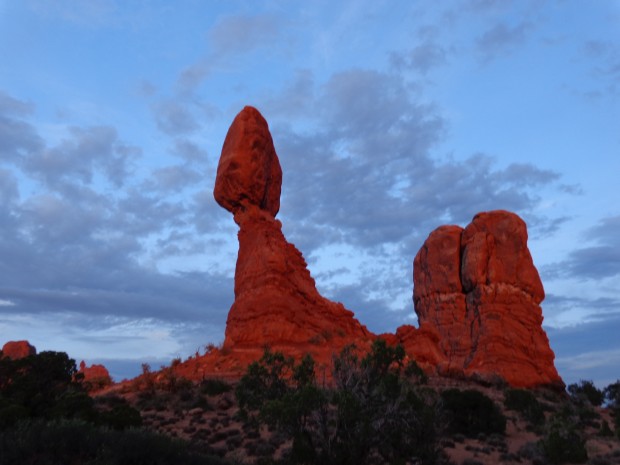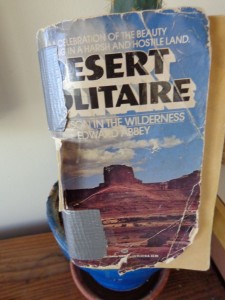He Had His Moments
categories: Cocktail Hour
6 comments

Balancing Rock last night…..
I drove into Arches last night, grumbling. It’s obligatory of course for someone writing a book about Ed Abbey to make the pilgrimage to this particular park, since this is the place he wrote his great book, Desert Solitaire. But it’s also a place that has fulfilled Abbey’s worst nightmares, and seems to celebrate not just wild red rock shapes, but the rise of the automobile. For all its grandeur, it’s a hard place to view without irony. You try and find a spot to create some quiet, some personal relationship with this unearthly landscape, to drink a beer and maybe smoke an honorary cigar, and revel in the desert quiet, but then the line of cars come ripping up the paved road, or, as happened to me, a camper full of loud kids lands right where you’ve tried to have your little ceremony.
“The spoiler has come.” This line from Robinson Jeffers comes into my mind. Abbey wrote in his journal that the search for transcendence was the most important thing. But he did his share of grumbling while he was here, and what doesn’t get much play in his book is the fact that he was going through a divorce and spending a lot of time in Hoboken. During his supposedly solitary stint his wife and kid lived with him for a while in the trailer. I am writing a book about both Wallace Stegner and Ed Abbey and compared to Stegner, who stayed married to the same woman his whole life, there are times that Abbey, with five kids with five wives, doesn’t look so great. The journals tell a story of a man fighting depression, a brave man true but an inconsistent one.
It turns out I’m a little inconsistent too. I walk back to my car to escape the camper. But who am I to grumble? How am I any less a spoiler than the family that now spills out over the rocks? Soon I’m driving again, gawking up at three giant sandstone chess pieces that someone has named, perfectly, The Three Gossips. Is it simply a case of too many of us in the world, of the fact that for something to feel sacred we must feel it is ours and not attainable by all? I know I don’t have any particularly profound relationship to this landscape, that I came here because of a book I read long ago. I believe this stunning place has lost its power to stun me. But it impresses: great sand doodles of rock, huge eye sockets in rock walls, muscular bulges of rock.
I’m in a bad mood when I reach Balanced Rock, but there is only one other car in the parking area which seems promising. And then something strange happens. All day there have been clouds. In fact today was the first time I’d seen rain and lightning while visiting Moab. But now the sun, just about to set, dips below the line of clouds in the west, and the whole place lights up. In particular Balanced Rock lights up. It is glowing now, and I notice my own feet hurrying to get closer to it. The only other person there is a man in a muscle shirt who has ignored the warnings about not stepping on cryptobiotic soil, and is right below the rock itself, snapping pictures furiously. He no doubt resents the intrusion of another human—this is my territory!—and respecting that I walk around the other side of the rock, giving us both a half privacy.
Ravens shoot by. Bats and swallows, too, both after the same thing. The rock is amazing: a 55 foot high boulder of slick rock balancing atop a more quickly eroding 71 foot high mudstone base. Dark is coming in like the tide, but the rock, high enough to catch the sun, stays light, turning that intense, almost-edible orange you only find here. Maybe I was too cynical too quickly. The sunset line blazes and turns the La Sal mountains pink. I feel a lift inside me. It is a moment.
On the way out I almost bump into the muscle-shirted photographer. But I now feel more benevolent toward my own species.
“You had some good luck with the light there, huh?” I ask.
“You betcha,” he says. “Got some real good ones.”
Soon I’m grumbling again, caught in a commuter line of red ember taillights, snaking out of the park. But I’m glad I came.
Maybe inconsistent is the wrong word for Abbey. Imperfect may work better. A writer I respect almost more than any other, and one not inclined to give much slack in terms of bad personal behavior, said that in Abbey’s particular case, he is “a great fan of the end result.” David Quammen put it this way: “A man wrote a book, and lives were changed.” There it is. When I make a list of my favorite books of the two authors I am writing about, I give Stegner the second through fifth places. But I can’t quite dislodge Desert Solitaire. It is because of that book that I am here and that , to some extent, that book has changed the way I’ve lived. And I know I’m just one of thousands of people who can say this. The other day, in Eldorado Canyon, there it sat on the park ranger’s desk. We like to say that words, that books, no longer matter much. But here is proof to the contrary.

My old book
Abbey wasn’t a perfect human being. But he had his moments. In fact “He Had His Moments” might be a good epitaph.
I don’t like feeling like a tourist. Or a Deadhead. I have come here because of Abbey, as have thousands of others, and while those thousands of others bug me, I have to admit I am one of them. That’s okay for now. While I didn’t find some great mystical oneness with this landscape, I did find something. And maybe there are times when all we can ask for are moments.


If you seek Desert Solitaire, come back in October. Looks like you forgot to hike to Delicate Arch. The drive to Dead Horse Point State Park, though not in your table of contents, is rewarding! Nice use of duct tape!
Good piece. Keep ’em coming Dave.
I still have a book of Robinson Jeffers poem from college–they just enthralled me back then. Loving the travels, Dave.
Your take on Abbey reminds me of Thoreau, the way he socialized and his mom did his laundry and/or fed him or something when he was “alone” at Walden. The book’s the thing in that case, too.
But your impressive essay here, Dave, reveals you as a character and an actor in a way that Abbey and Thoreau, and for all I know, Stegner, would never have tried. But which I think is an advancement—admitting one’s flaws or just one’s basic human funks and irritation openly. IS this an advancement in nonfiction? I guess Montaigne was pretty confessional, so maybe not.
I for one dislike the sanctimony in so much nature writing, and its latent sentimentality, and the implied superior nobility of the writer, and so I love this piece.
Thank you, Richard. I’m about to head in backpacking on Indian Creek near Canyonlands. This will sound a tad arrogant, but I’ve always said what interests me in this sort of writing is the ecotone (if you will!)between Montaigne and Thoreau. Encountering the world outside the self but not forgetting that the self, with all its equivocations, is part of the drama. (I’ve actually had a correspondence with a nature writer who does not like this approach. Too wishy-washy.)
There’s another ecotone involved, which is the one between science and expression. There’s nothing wishy-washy about admitting that numbers and replicable results don’t tell the whole story. Are you still using your 8-dollar backpack?